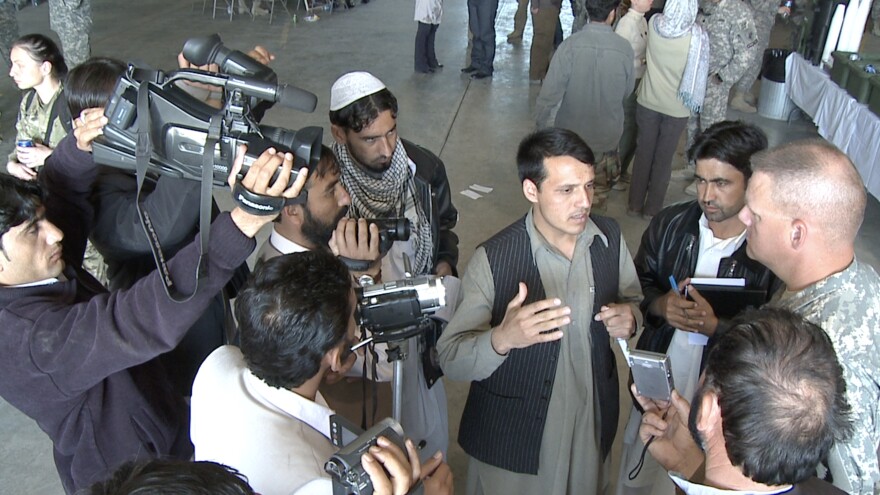A new documentary details an incredible moment in history, through the eyes of brothers who lived it, and barely escaped Afghanistan with their lives.
TPR spoke with one of the brothers, and the documentarian who captured it all.
You probably saw news stories as American forces left Afghanistan. Chaotic moments at the airport when thousands of Afghans tried to get on American military flights leaving the country.
Filmmaker Robert Ham’s new film details that time period, and the human stories behind them. He said his upbringing inspired him to take on a filing like this.

“9/11 happened when I was 18, and that really impacted me, as did the rest of the country,” Ham Said. “I graduated [college] in 2005, having traveled a lot throughout the world, and decided in 2007 to join the military as a combat videographer.”
He was stationed in Southeastern Afghanistan in a city and province called Khost, where he met a pair of brothers working as interpreters for the U.S. Army. He worked closely with both and after keeping in touch for these 16 years since, he’s now documented their struggles.
“I just finished a documentary called Interpreters Wanted, and it's basically about their journey from when I met them that Afghanistan, talking about their history, how they grew up in this war-torn country, and their harrowing journey from Afghanistan through to America,” he said.
Ismail Haqmal is one of those brothers.
“I have a bachelor's degree in literature. I speak Pashto. I speak Dari. I speak Hindi and Farsi. And English,” he said.

Since Ismail knew the region’s four most common languages plus English, he had value to the U.S. Army as an interpreter.
“It was a difficult job. It was not only just translating, it was connecting to people,” Ismail said.
Ham put it succinctly.
“Big picture: America couldn't do anything without interpreters, he said. “I don't think I knew one soldier that was American that spoke Pashto or Dari, which are the two main languages spoken in Afghanistan.”
Most of the time translating, Ismail was surrounded by armed American soldiers in tense situations. One day while with a unit, Ismail heard that a suicide bomber would be paying them a visit, so they began packing up to leave.
“And then a guy with an Afghan police uniform, he was coming towards us,” Ismail said.
He saw the man’s suicide vest, then turned to run back toward his team.
“He didn't stop. So they had to shoot him. And then at that time [there was a large boom], he blew up himself up and I was very close to him,” Ismail said. “I got wounded, but it was not that serious. So that was the life of an interpreter.”
Suicide bombers were rare, but coming across Improvised Explosive Devices, or IEDs was not.
“Every time we go out, at least one bomb blast was just like a regular day for us. And ambushes—a lot. Very tough job,” Ismail said.
Robert Ham explained the interpreters weren’t a luxury. They were essential.
“We needed thousands of interpreters. And they went on literally every single mission that any infantry unit went out on,” Ham said.
And Ismail said the danger to interpreters didn’t stop when they went home from work. “Once our house was bombed, and then my dad, his car was blown up, and he lost both of his feet. And we've been through a lot of stuff,” he said.
In the meantime, the promise to the interpreters was that when it was over, they would be granted into the United States through a Special Immigrant Visa, or S-I-V.
“Special Immigrant Visas were promised to interpreters who had served a certain period of time,” Ham said. “I think it was usually around two and a half years of service.”
Given Ismail and his brother’s 10-year service, quick approval seemed obvious. But bases began to close and, in turn, the dwindling number of personnel to deal with SIVs slowed it to a crawl. Ham has looked hard at the process, and still can’t understand why it hasn’t moved faster.
“This is not a partisan issue, because if you look at the people who've been advocating on behalf of interpreters since the SIV began, Democrats and Republicans and independents agree pretty much across the board, why can't you get it done?” Ham said.
In 2017, Ismail was granted his SIV and moved to San Antonio. He has a wife and two other reasons to immigrate here.
“I have two kids. I have a son and I have a daughter,” Ismail said. “So my son is nine years. And my daughter, she's seven. They both go to school.”
His daughter going to school wouldn’t have happened if they still lived in Afghanistan.
“I'm self-employed, I work from home and also I do Uber and Lyft,” he said. “I started my YouTube channel recently in both languages, one is in Pashto and one is in English.”
If you’re wondering where you can catch Interpreters Wanted, you can’t quite yet. Ham has been applying to film festivals all around, and just recently it was accepted to the Gig Harbour film festival. If the film acquires accolades at festivals, it will likely be shown on one of the cable channels. He said he hopes more Americans will get to hear the story of the Haqmal brothers.
“It's amazing to think how resilient these men are and to think what we are gaining by having them in our country is a tremendous gain,” Ham said. “And it also breaks my heart that they have lost their country yet again to radicals.”
The brothers are both glad they came, even though it was such a hard road to get here.
Copyright 2023 Texas Public Radio. To see more, visit Texas Public Radio. 9(MDA4OTAxNzAzMDEzMjc0MTc2MzA5ZDZlMw004))








